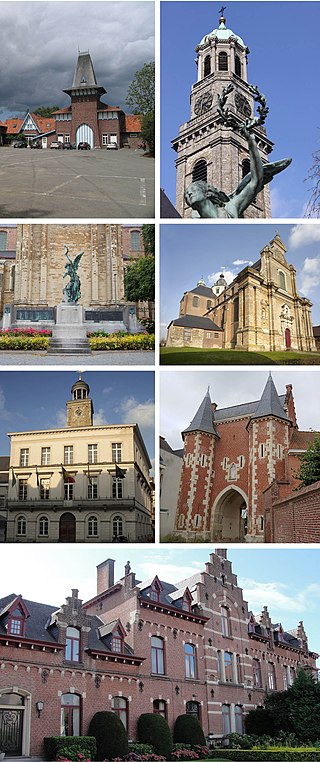
Ninove is a city and municipality in the Flemish province of East Flanders in Belgium. It is on the river Dender, and is part of the Denderstreek. The municipality comprises the city of Ninove proper and since the 1976 merger of the towns of Appelterre-Eichem, Aspelare, Denderwindeke, Lieferinge, Meerbeke, Nederhasselt, Neigem, Okegem, Outer, Pollare and Voorde. On 1 January 2023 Ninove had a total population of 40.090. The total area is 72.57 km2 which gives a population density of 553 inhabitants per km2.

The Open Flemish Liberals and Democrats is a Flemish conservative liberal political party in Belgium. A smaller fraction within the party has social liberal views.

Flanders is both a cultural community and an economic region within the Belgian state, and has significant autonomy.

Vlaams Belang is a Flemish nationalist, and right-wing populist political party in the Flemish Region and Brussels Capital Region of Belgium. It is widely considered to be on the political far-right.

Flemish political parties operate in the whole Flemish Community, which covers the unilingual Flemish Region and the bilingual Brussels-Capital Region. In the latter, they compete with French-speaking parties that all also operate in Wallonia. There are very few parties that operate on a national level in Belgium. Flanders generally tends to vote for right-wing, conservative parties, whereas in French-speaking Belgium the socialist party is usually the most successful one.
The draining law or Belgian dry up law (droogleggingswet) refers to a controversial law passed by the Belgian Federal Parliament in 2005 to cut funding by the federal state to "undemocratic" parties. Due to restrictions against campaign donations from private groups or individuals, Belgian political parties rely mostly on the state for funding.

Federal elections were held in Belgium on 10 June 2007. Voters went to the polls in order to elect new members for the Chamber of Representatives and Senate.
The 2007–2008 Belgian government formation followed the general election of 10 June 2007, and comprised a period of negotiation in which the Flemish parties Flemish Liberal Democratic, Christian Democratic and Flemish (CD&V) and New Flemish Alliance (N-VA), and the French-speaking parties Reformist Movement (MR), Democratic Front of Francophones (FDF) and Humanist Democratic Centre (CdH) negotiated to form a government coalition. The negotiations were characterized by the disagreement between the Dutch- and French-speaking parties about the need for and nature of a constitutional reform. According to some, this political conflict could have led to a partition of Belgium.
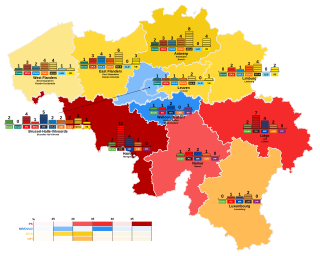
Federal elections were held in Belgium on 13 June 2010, during the midst of the 2007-11 Belgian political crisis. After the fall of the previous Leterme II Government over the withdrawal of Open Flemish Liberals and Democrats from the government the King dissolved the legislature and called new elections. The New Flemish Alliance, led by Bart De Wever, emerged as the plurality party with 27 seats, just one more than the francophone Socialist Party, led by Elio Di Rupo, which was the largest party in the Wallonia region and Brussels. It took a world record 541 days until a government was formed, resulting in a government led by Di Rupo.

The Belgian provincial, municipal and district elections of 2012 took place on 14 October. As with the previous 2006 elections, these are no longer organised by the Belgian federal state but instead by the respective regions:
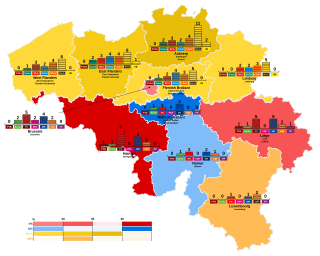
Federal elections were held in Belgium on 25 May 2014. All 150 members of the Chamber of Representatives were elected, whereas the Senate was no longer directly elected following the 2011–2012 state reform. These were the first elections held under King Philippe's reign.
Katholiek Vlaams Hoogstudentenverbond (KVHV) or the Catholic Flemish Students' Union is a political student society which concerns Flemish nationalism and conservatism. It accepts male and female members and has chapters in Ghent, Leuven, Antwerp, Brussels, Aalst and Sint-Katelijne-Waver. Previously KVHV had chapters in Kortrijk, Ostend, and Mechelen.
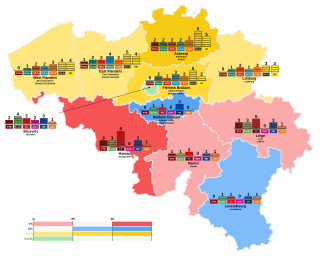
Federal elections were held in Belgium on 26 May 2019, alongside the country's European and regional elections. All 150 members of the Chamber of Representatives were elected from eleven multi-member constituencies.

Hilde Vautmans is a Belgian politician of the Open Vlaamse Liberalen en Democraten who has been serving as a Member of the European Parliament since January 2015, representing the Dutch-speaking electoral college of Belgium.
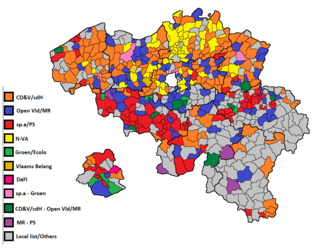
The Belgian provincial, municipal and district elections of 2018 took place on Sunday 14 October 2018. They are organised by the respective regions:
In the run up to the 2024 Belgian federal election, various organisations carry out opinion polling to gauge voting intention in Belgium. The date range for these polls are from the 2019 Belgian federal election, held on 25 May, to the present day. The results of nationwide polls are usually numerically split into the three Belgian regions: Flanders, Brussels and Wallonia. Federal seat projections for the Chamber of Representatives are presented together under these regional polls. The federal election will be part of a group of elections which also include the regional elections and the European elections, some polls might be undefined voting intentions without differentiating between the elections.
An election will be held on 9 June 2024 in the three Belgian constituencies to elect the Belgian delegation to the European Parliament. It is part of the 2024 European Parliament election and the 2024 Belgian elections.
Lode Claes was a Belgian economist author, journalist and politician who was active within the Flemish nationalist movement.













